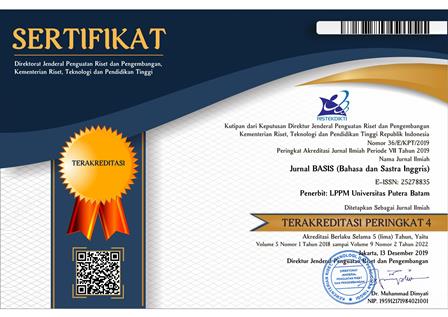ANALYSIS OF ADDRESS TERMS IN JUSTICE LEAGUE MOVIE
DOI:
https://doi.org/10.33884/basisupb.v7i2.2427Keywords:
Address Term, Movie, Reason, TypeAbstract
The aim of this research was to analyze the type and reason of address terms in WhatsApp group of Putera Batam University Justice League (2017) movie. This research is descriptive qualitative research. The research used observational method non-participatory technique to collect the data. The data was analyzed by applying the theory of Wardaugh (2010). The results found that the type of address terms were 8 data in first name (FN) in Man, Alfred, Diana, Barry, Howard, Silas, Bruce, Victor, 2 data in last name (LN) in Allen, Lane, 2 data in title (T) in Queen, Soldiers, 1 data in title plus last name (TLN) in Ms. Prince, 4 data in pet name (PN) in Aquaman, Batman, Cyborg, Superman and 3 data in kinship term (KT) in Dad, Mother, Child. The research also found the reasons of address term with 12 data in intimacy in Ma, Children, Diana, Man, Victor, Arthur, Barry, Alfred, guys, Bruce, Mom, Superman, 5 data in power differential in Mr. Wilson, Master Wayne, ma'am, insects, Luthor and 3 data in equality in Clark, Steppenwolf and Kal-El. Based on the results, it can be concluded that first name (FN) is the most found type of address term and intimacy is the most in reason of address term.
References
Ethelb, H. (2015). Using address terms in showing politeness with reference to their translation from Arabic into English. International Journal of Comparative Literature and Translation Studies, 3(3), 27-37. https://doi.org/10.7575/aiac.ijclts.v.3n.3p.27
Holmes, J. (2013). An introduction to sociolinguistic (4th ed.). New York, NY: Routledge.
Nalendra, A., Wulandari, A., Khoirunnada, M., Susanti, I., & Putra, O. (2018). An analysis of addressing term in used in the Love Rosie movie. Progressive Journal, 13(2), 71-78. DOI: https://ejournal.nusamandiri.ac.id/index.php/ progressive/article/view/529
Ozcan, F., H. (2016). Choice of address terms in conversational setting. International Journal of Human Sciences, 13(1), 982-1002. DOI: https://j-humansciences.com/ojs/index.php/IJHS/article/view/3489
Pauletto, F., Aronsson, K., & Galeano, G. (2017). Endearment and address terms in family life: Children’s and parents’ requests in Italian and Swedish dinnertime interaction. Journal of Pragmatics, 109(3), 82-94. https://doi.org/10.1016/j.pragma.2016.12.014
Prasetyoaji, A. (2020). Transivity on elon musk’s online biography:a social actors discourse analysis. Journal Basis, 7(1), 13-24. DOI: https://doi.org/10.33884/basisupb.v7i1.1673
Rahmadani1 & Wahyuni, D. (2018). Types and functions of address terms used by IPMK-SB “Kampar Students Studying in Padang”. E-Journal of English Language & Literature, 7(1), 132-142. DOI: http://ejournal.unp.ac.id/index.php/jell
Simanjuntak, D. (2020). Penerapan teori antropolinguistik modern (competence, performance, indexicality, & partisipation) dalam umpasa budaya batak toba. Journal Basis, 2(2), 71-78.
DOI: http://ejournal.upbatam.ac.id/index.php/basis/article/view/407
Sudaryanto (2015). Metode dan aneka teknik analisis bahasa. Yogyakarta, Indonesia: Sanata Dharma University Press.
Tauchid, A. (2018). In search of address terms in novel. Loquen: English Studies Journal, 11(2), 15-28. DOI: http://dx.doi.org/10.32678/loquen.v11i02.1278
Wardaugh, R. (2010). An introduction to sociolinguistics. England: Wiley Blackwell.
Yule, G. (2017). The study of language. Cambridge, United Kingdom: Cambridge University Press.
Arianto, T., & Simanjuntak, D. S. (2020). Representation of ecocriticism in the folklore of Mak Ungkai spirit. Studies in English Language and Education, 7(2), 576–591. http://e-repository.unsyiah.ac.id/SiELE/article/view/16822
Wardaugh, R., & Fuller, J. M. (2015). An Introduction to Sociolinguistics. In B. B. Ltd (Ed.), Journal of Chemical Information and Modeling (Seventh Ed). Wiley Blackwell. https://doi.org/10.1017/CBO9781107415324.004
Downloads
Published
Issue
Section
License

















